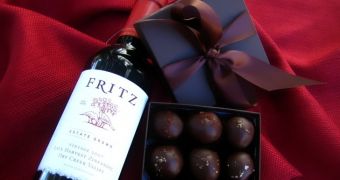A study whose findings have recently been published in the Journal of Neuroscience has probably provided people with the perfect excuse to drink more red wine and eat more dark chocolate.
Thus, the study's authors maintain that, according to evidence at hand, a compound found in both these two treats has the potential to boost a person's short-term memory, Live Science informs.
In their paper in the Journal of Neuroscience, the specialists behind this research project detail that the compound in question is known as resveratrol, and that evidence indicates its memory-boosting abilities work best in overweight individuals.
In order to investigate how resveratrol influences short-term memory, the researchers asked for help from 46 volunteers who, despite being overweight, were in good health condition.
The volunteers were split into two groups, of which one was given resveratrol supplements on a daily basis for a period of time of six months and another was given placebo. Neither of the volunteers knew whether they were taking resveratrol or placebo.
Once the six-month period came to an end, the people who agreed to take part in this study had their short-term memory, together with the makeup of their brain and their ability to break down sugars, assessed by the researchers.
It was thus discovered that, when compared to the volunteers who took placebo on a daily basis throughout the six-month study period, the ones who were actually given resveratrol supplements had an easier time recalling short-term memories.
Besides, the brains of people in this group were found to display more connections between key areas previously documented to be involved in memory, and to be able to break down sugar in their body easier than the volunteers who took placebo.
“From a clinical point of view, our findings suggest that regular, high-level intake of resveratrol in the elderly may convey protective effects on cognitive functions, a hypothesis that now needs to be evaluated in large-scale clinical trials,” researcher Veronica Witte says in an interview.
This study is not the first to find that resveratrol can have positive effects. On the contrary, previous investigations showed that this compound could help fight back aging and benefit the heart. What's more, resveratrol is argued to also have anti-cancer properties.
As encouraging as the outcome of Veronica Witte's and fellow researchers' investigation might be, the fact remains that, all things considered, 46 volunteers do not exactly make a proper study sample. Hence, it might not be such a bad idea if further research into how resveratrol influences memory were to be carried out.

 14 DAY TRIAL //
14 DAY TRIAL //